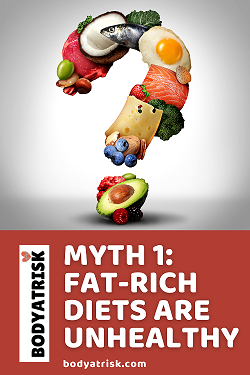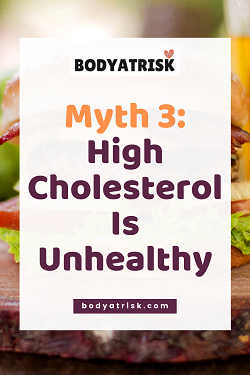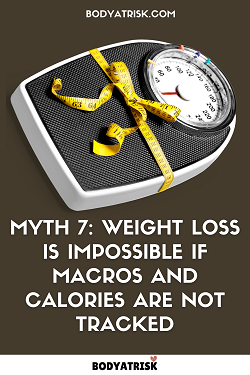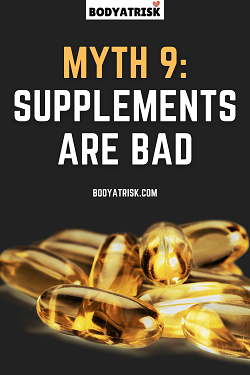We’ve busted the ten most common myths about nutrition. “You are what you eat.” Truth is always hard to find (especially the truth about healthy eating). Therefore, today we shall unravel some of the nutrition myths lurked in due to false media campaigns and rigid orthodox beliefs.
Myth 1: Fat-Rich Diets Are Unhealthy
It is common to observe that anyone who starts with a healthy diet plan cuts down on fat diets. This myth that “high-fat diets are unhealthy” is far from being true.
Polyunsaturated fats (from Avocados, Salmon, and Mackerel) are super beneficial, and therefore, they are parts of weight loss Keto diets.

A high-fat diet is as effective as a low one in encouraging weight loss, a study suggests.
Myth 2: Low Fat Diet Is Good
Fats are essential for the normal working of the body. Essential fats must be taken in the diet as their lack can lead to increased insulin resistance and a greater risk of heart issues. A study suggests polyunsaturated fatty acids (PUFAs) lower the risk of diabetes development by 40%. Therefore, a low-fat diet is not a good idea for weight loss and overall health.
Myth 3: High Cholesterol Is Unhealthy
Cholesterol-rich foods are notorious for their impacts on the body. This, too, is a myth as cholesterol-rich foods (eggs, yogurt, and sardines) are beneficial in cognitive improvement, as found in a study. It is because your brain has vast amounts of cholesterol, and its intake improves brain health.

Adequate cholesterol intake is inversely associated with obesity.
Myth 4: Carb-Diet Leads To Weight Gain
Refined carbohydrates such as those you get in bakery items and fizzy drinks are the culprits for weight gain and heart attack. However, natural carbs from fruits such as berries and other fruits are nothing but beneficial when taken in along with fibers.
Carbs from fast food are not good for the body. Oats, bananas, sweet potatoes, and apples are all good carbohydrates that have multiple positive effects on the body.
Myth 5: Breakfast Is The King
Taking breakfast is a healthy habit, but it’s not imperative to eat early in the morning (can cause weight gain). Delaying your food intake to the latter half of the day has shown to have a myriad of health benefits, so does breakfast skipping.

Breakfast is vital for the growth of children and young (teenagers). People with increased nutrient needs (such as pregnant ladies) should also not quit breakfast, which can have negative health impacts.
Myth 6: Concentrating On Macronutrient Ratio Is Important
Macronutrients are those nutrients that our bodies need in large amounts for proper functioning, thus the name – macronutrients. This includes carbohydrates, fats, and proteins. Fitness coaches advocate tweaking your macro ratios.
Tracking your macronutrient ratio (as declared by your fitness coach) is a healthy activity, but the food quality is the elephant in the room.
Myth 7: Weight Loss Is Impossible If Macros And Calories Are Not Tracked
Food tracking is beneficial, but only if done within limits. You don’t need to be obsessed with your calorie intake when losing weight and take it easy. Excessive calorie tracking is worse as it is associated with more eating tendencies.

The real way is to keep a balance and make it a source of tension.
Myth 8: Non-nutritive Sweeteners Are Good
Non-nutritive sweeteners are commonly used to replace sugars and are branded as sugar-free foods useful for the body but have worse impacts on the body. One of which is negative shifts in gut microflora. This can lead to digestive issues and diabetes.
Their use is not recommended for optimal health. According to a study, NNS is linked to hazards such as heart issues, chronic kidney problems, and increased risk of Alzheimer’s.
Myth 9: Supplements Are Bad
Supplements aren’t just fad campaigns but are beneficial too. People with health conditions should consider taking supplements because they help. For example, supplementation can improve heart health.

Magnesium and vitamin B supplementation has been shown to improve type-2 diabetes conditions and reduce associated heart disease risk, a study suggests.
Myth 10: Probiotics Are For Everyone
Probiotics are live microorganisms (bacteria) that are often referred to as good bacteria. You can obtain probiotics from natural products such as kefir and opt to have probiotic supplements.
Nowadays, we see strong campaigns and advocacies from doctors to take probiotics.
The truth is that probiotics should be taken with precaution because they may lead to abnormal gut flora and are not recommended for just everyone.
Conclusion
Nutrition myths have plagued our society for a long time. It is essential to know that fats, carbs, and supplements don’t harm the body. The ratio of all these macronutrients should be taken care of, but that too, without any obsessions.

1 comment
[…] Read our article on 10 Common Nutrition Myths And Why They Are Myths? […]
Comments are closed.